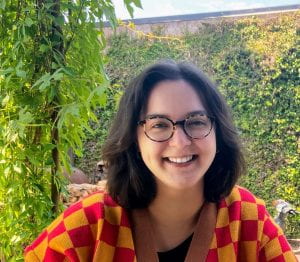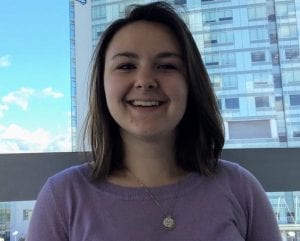Holly Aleksonis, M.A.
Master’s Thesis: Quantification of White Matter Hyperintensities in Long-Term Survivors of Childhood Brain Tumor: Relationships with Cognition
General Exam: Relationships Among Structural Neuroimaging and Neurocognitive Outcomes in Adolescents and Young Adults with Congenital Heart Disease: A Systematic Review
Dissertation: Structural Brain Network Properties and Relationships with Cognition in Adolescents and Young Adults with Congenital Heart Disease
Holly grew up in New Hampshire and obtained her Bachelor’s of Science degree from the University of Mary Washington in 2016 with a major in Psychology and Neuroscience. Following her undergraduate degree, Holly worked as a full-time research assistant at Nationwide Children’s Hospital investigating neural mechanisms of executive and social-cognitive functioning following pediatric traumatic brain injury as well as neurocognitive sequelae after pediatric brain tumor. She entered GSU as a doctoral student in the Clinical Neuropsychology program under the mentorship of Dr. King in Fall 2018. Her research interests include utilizing neuroimaging and neuropsychological methods to identify neurocognitive outcomes in survivors of pediatric brain injury and disease. She is a former recipient of the Brains & Behavior Graduate Research Fellowship, and is currently funded by the Dynamic Multiscale and Multimodal Brain Mapping Across the Lifespan (D-MAP) fellowship through GSU’s Center for Translational Research in Neuroimaging & Data Science (TReNDS).
Stephanie Steinberg, M.A.

Stephanie grew up on Long Island and received her Bachelor of Science in Human Development, with a specialization in Human Behavioral Neuroscience, from Cornell University in May of 2019. Three months later, Stephanie started at GSU as a doctoral student in clinical neuropsychology under the mentorship of Dr. King. She is interested in combining neuroimaging and neuropsychological assessment methods to examine the neuroanatomical underpinnings of human behavior and cognition. Stephanie looks forward to developing her research interests in the long-term neurocognitive outcomes of pediatric brain pathology as a member of the King Lab. She is a recipient of the Research on the Challenges of Acquiring Language and Literacy (RCALL) graduate student fellowship.
Olivia Haller, M.A.

Originally from Minneapolis, Olivia obtained her Bachelor of Arts in Behavioral Neuroscience and Classical Studies from Colgate University in 2017. During her undergraduate career, Olivia worked on several projects studying traumatic brain injury and post-traumatic stress disorder at the University of Minnesota and Baylor College of Medicine. Upon completion of her undergraduate degree, she joined the Boston University Chronic Traumatic Encephalopathy Center, where she worked as the Recruitment and Retention Coordinator for the DIAGNOSE CTE Research Project. Her research interests include utilizing advanced neuroimaging techniques to investigate later-life cognitive, behavioral, and mood outcomes in clinical populations. She is currently funded by the Brains & Behavior Graduate Research Fellowship through the GSU Neuroscience Institute.
Jordan Pincus

Jordan grew up in South Florida and received her Bachelor of Science in Neuroscience and Behavioral Biology from Emory University in 2019. As an undergraduate research assistant in the Dilks Lab, she studied the development of scene processing abilities and cortical regions. After graduation, Jordan worked at the Marcus Autism Center. There, she used eye-tracking and neuroimaging to investigate the neurobiological processes underlying neurodevelopmental disorders, such as autism spectrum disorder and 3q29 deletion syndrome. Jordan is excited to stay in Atlanta and join Dr. King’s lab as doctoral student in clinical neuropsychology in Fall 2021. She is broadly interested in understanding how the brain, cognition, and behavior change throughout development and following neurodevelopmental disruption. She looks forward to utilizing neuroimaging and neuropsychological methods to investigate how brain damage in childhood interacts with development and impacts neurocognitive outcomes later in life. She is a recipient of the Brains & Behavior Graduate Research Fellowship through the GSU Neuroscience Institute and the NSF Graduate Research Fellowship.
Lindsay Smegal

Originally from Kensington, MD, Lindsay received her Bachelor of Science in Neuroscience with a minor in Pharmacology from the University of Vermont in 2019. After graduating, she worked as a full-time research assistant for two years at the Kennedy Krieger Institute in Baltimore, MD, where she worked on several projects aiming to improve the early diagnosis and treatment of Sturge-Weber syndrome, a rare neurocutaneous disorder. Lindsay subsequently worked for two years as a full-time clinical research coordinator at Massachusetts General Hospital in Boston, MA, investigating the modulatory effects of the locus coeruleus on cognition and brain integrity within the context of aging and Alzheimer’s Disease. Lindsay is thrilled to join the King Lab at GSU as a Clinical Neuropsychology Ph.D. student in the Fall of 2023. Broadly, her research interests include utilizing neuroimaging and neuropsychological methods to learn more about the impact of neurodevelopmental disruption on cognition over the life span and improving early detection and treatment of neurodevelopmental disorders. She is a recipient of the Brains & Behavior Graduate Research Fellowship through the GSU Neuroscience Institute and was also selected for the Clinical Neuropsychology Scholar Award.
Cassie Rosenberg

Cassie is originally from Ponte Vedra Beach, Florida, and received her Bachelor of Science from the University of North Florida in 2020. Following graduation, Cassie joined Mayo Clinic Florida as a research assistant in the Graduate Research Education Program (GREP) where she studied genetic risk factors in Alzheimer’s disease for 2 years. After completion of the program, Cassie served as a Clinical Research Coordinator, where she examined the underlying mechanisms of post-stroke cognitive impairment and dementia through neuropsychological assessments, neuroimaging, and genetic/biomarker testing. Cassie is excited to join the King Lab at GSU as a Clinical Neuropsychology Ph.D. student in the Fall of 2023. Her research interests include utilizing neuroimaging, neuropsychological, and genomic methods to understand the variation in cognitive outcomes among pediatric brain tumor survivors. She is a recipient of the 2CI Neurogenomics Fellowship at GSU.
